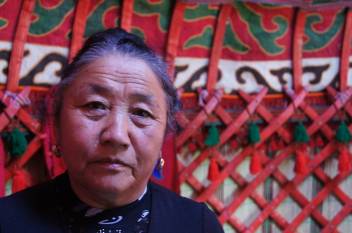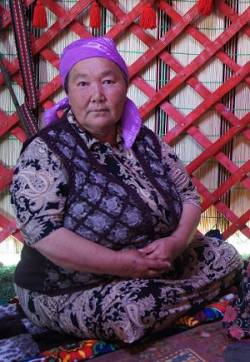In Jany-Aryk, a village five hours drive from the Kyrgyz capital, Bishkek we sat in a yurt, draped with rich, bright fabrics, listening to older women and their grandchildren sing and play music. This was my introduction to the older people’s groups in Kyrgyzstan, set up by HelpAge to ensure older people can live without violence and enjoy their rights.
With World Elder Abuse Awareness Day on 15 June, the timing was perfect to find out how older people are working to claim their rights and highlight the abuse that still exists.
Empowered older people better their communities

Rights abuses are a complex and emotional issue and some stories we heard were upsetting. However, I felt positive that these groups are having an impact on entire communities; not just older people. They are strengthening families, changing attitudes, empowering the people who are part of them and bringing generations together.
Joining me and Guliya Abitova, HelpAge project manager in Kyrgyzstan, was Darika, 72, the head of a “crisis centre” in neighbouring Karakol.
HelpAge is working with The Association of Crisis Centres in two nearby centres but also throughout the country. They coordinate the older people’s groups and offer counselling and legal advice.
Stigma of abuse
Darika gave us an insight into the difficulties of tackling abuse: “Most abuse cases happen in winter. People here work in the fields, so only three months a year. There is nothing to do in the winter, families sit at home and many people drink a lot.
“Older people don’t want to talk about abuse because of the stigma attached to it. They feel it’s their fault if the abusers are their children, like they haven’t raised them properly.”
We then spoke to a member of the older people’s group, Kaikeh, 61:
“Before the group, no one paid attention to older people. Now we are visible. Young people help us with things like cleaning our homes and fetching wood. I live with my husband and grandchildren, as my children are working abroad. Caring for my grandchildren is a joyful experience, but it can be hard.”
Then I realised I had only met older women and their grandchildren. This was true for all the groups we visited. As many young people leave rural areas of high unemployment to find work, grandmothers bring up grandchildren on their own, with little support.
Raising grandchildren with no support
In Kara Oy village, for example we met Rosa, 71, who was in this situation and had suffered very bad abuse:
“I’ve brought up my two grandchildren who are 15 and 20 with the money I get from my pension – nobody has helped me. My daughter is 42 and drinks a lot since her divorce. She says horrible things to me when she drinks. I have three other children who all work in Russia but they say they are too poor to help. My husband has beaten me since we got married 55 years ago. He doesn’t anymore though; he has pneumonia and is in hospital.
“The older people’s group is trying to get my daughter help for alcohol addiction. They’ve made me feel I’m not alone. I was ashamed before but one member persuaded me to come to a meeting and now I can talk about my problems.”
Fighting for the right to stay in her house
 The groups carry out a lot of other activities that are making a difference. The relationship between mothers and daughters in law can be tense, so they organise contests for “the best mother/daughter in law”. The members of the group showed me photos of the winners and said this had helped to improve family relationships.
The groups carry out a lot of other activities that are making a difference. The relationship between mothers and daughters in law can be tense, so they organise contests for “the best mother/daughter in law”. The members of the group showed me photos of the winners and said this had helped to improve family relationships.
Older people’s groups also take up rights abuses with local administrations. Malika, 56, was being forced out of her house when her group stepped in:
“I lived with my second husband for 26 years, but we didn’t have any children. When he died, his family came to kick me out. The older people’s group and crisis centre defended me. They organised a meeting with the local administration and women’s council. Because they helped me, I’m still in my house and fighting.”
I also asked the group members themselves how they felt about being
involved in this work. Without exception, they said they felt more
confident, open and even younger! Even when the project ends, they
vowed to keep working.
Lobbying governments to take action
As part of the first ever Age Demands Action for Rights, older campaigners in Kyrgyzstan are organising a photography exhibiton in Bishkek on 15 June, World Elder Abuse Awareness Day, to bring attention to the issue.
They will also collect signatures for our petition calling for a UN convention on older people’s rights. The petition will then be presented to government representatives later in the year.
Show your support!
Rights abuses like this are hard to accept and action has to be taken at all levels, from the community to international, for it to stop. These amazing babushkas are fighting injustice in their communities – but they need your support.
Sign our petition to help those like Rosa and Malika.
